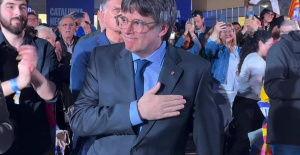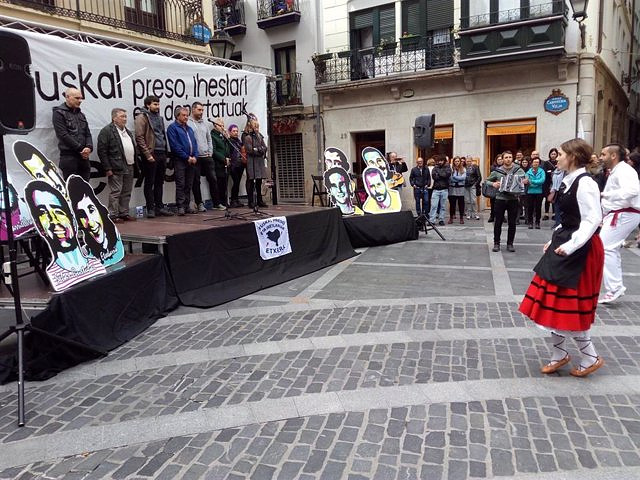He highlights that Sortu as a party is the one who, increasingly, organizes these events and is "the biggest obstacle to coexistence in the post-terrorism"
BILBAO, 4 Ene. (EUROPA PRESS) -
The Collective of Victims of Terrorism, Covite, has registered a total of 466 acts of support for ETA throughout 2023 in its Radicalization Observatory, which represents a decrease of 21% compared to 2022, the year in which they detected 589 In addition, there has been a disappearance of the 'ongi etorris' to ETA prisoners upon their release from prison.
Furthermore, he highlighted that Sortu as a party is the one who, increasingly, organizes these acts of "glorification" of the terrorist organization, and is what represents "the greatest obstacle to coexistence in the post-terrorism period."
As Covite has reported in a statement, 2023 has been the first year in which it has not recorded any welcoming ceremony for inmates of the gang since it began to publicly denounce them at the end of 2016.
The president of this association, Consuelo Ordóñez, believes that it is "very good news for the victims, as these are the most humiliating acts." "We have come to report 'ongi etorris' that took place under the house of one of the victims of a bloodthirsty ETA murderer, such as that of Javier Balerdi in San Sebastián on December 21, 2016. I can't think of an infamy greater than that," he assured.
Ordóñez has pointed out that the fact that "these aberrant acts have disappeared is positive, both for the victims and for society in general."
Covite has attributed the disappearance of the 'ongi etorris' to their "constant work of documentation and public denunciation of this type of humiliating and undignified acts", which has resulted in "the rejection of the majority of Basque, Navarrese and Spanish society to the 'ongi etorris', as well as the condemnation of most institutions and political forces, "except for EH Bildu."
In any case, it emphasizes that "the public legitimization of ETA through other types of acts is still very present in the streets of Euskadi and Navarra", as reflected by the acts documented in the Radicalization Observatory throughout 2023.
Of the total events carried out, 173 have taken place in Guipúzcoa, 162 in Vizcaya, 67 in Navarra, 40 in Álava, 14 in other provinces and 10 abroad, especially in the French Basque Country.
Regarding the typology of acts of support for ETA, 178 have been demonstrations in which the release of imprisoned ETA members has been demanded; 166 graffiti and banners explicitly praising the gang and its inmates; 48 public tributes to deceased ETA members; 27 popular festivals celebrated specifically to praise ETA, such as the 'Gudari eguna'; 5 tributes to prisoners on public roads, in which their photo is placed and an aurresku is danced to them (a new act this year), and 42 acts that could not be classified in any of the previous categories.
Covite has insisted that "the cult of ETA and its terrorists is far from disappearing", and has demanded a "greater involvement of the institutions, especially those of the Basque Country and Navarra, to put an end to this scourge."
This association of victims has also shown its concern about the possibility of the bill that Sumar registered in the Congress of Deputies to go forward to decriminalize article 578 of the Penal Code, which establishes penalties of one to three years in prison. for those who glorify or justify terrorism, and for those who carry out acts that "involve discredit, contempt or humiliation of the victims of terrorist crimes or their families."
In the words of Consuelo Ordóñez, "although it is true that Covite has verified first-hand that the judges of the National Court, in the current context of the disappearance of ETA as a terrorist organization, no longer wanted to apply this article to judge" these types of events. , the repeal of this article "can send a message to society that the glorification of ETA is a non-existent reality, which is not true."
The president of Covite has reiterated that, "despite verifying, through facts, that this article does not serve to end the glorification of ETA terrorism in Euskadi and Navarra", they are concerned "that it could be installed in the society the false idea that this is a scourge for which the institutions have no responsibility, when they do.
In this sense, it refers to the recently approved Law 9/2023, of September 28, on the Historical and Democratic Memory of Euskadi, which contemplates an administrative sanctioning regime for "all acts of public display of elements or mentions in commemoration, exaltation or individual or collective glorification of the 1936 coup d'état and the Franco dictatorship, its leaders or the organizations that supported the regime (article 30 of said law)".
For this reason, it demands "exactly the same for acts of public display of support and legitimation of ETA's terrorism." In his opinion, it is time for public institutions to "address the phenomenon of violent radicalization in favor of ETA in the Basque Country and Navarra with the seriousness and urgency it deserves."
Covite has highlighted that, "increasingly, it is Sortu as a political party that organizes all these acts of public legitimization of ETA and its terrorists", which shows that "the leaders of the nationalist left are those who contribute the most to violent radicalization of a part of Basque society".
"Hundreds of young people are growing up with the idea that ETA members are heroes, 'political prisoners' or 'political refugees' because that is what the Sortu spokespersons convey," he criticized, insisting that "asking for the release of those who are in "Prison for very serious crimes may be legal, but it is a clear symptom of moral abnormality." "Do we see in France hundreds of people in the streets asking for the release of jihadist terrorists?" he asks himself.
Covite considers that the nationalist left, with its attitude that "glorifies and justifies ETA's terrorism", represents "the greatest obstacle to coexistence in the post-terrorism period", since coexistence "in peace and freedom will always be incompatible with the existence of "a political identity that is built on contempt for the victims of ETA."
For this reason, he describes the lessons of the nationalist left on peace and coexistence as "pure cynicism." "Publicly displaying posters with photographs of the murderers of our relatives, and also doing so with boasting and pride, or calling them 'political prisoners', represents an attack on the most basic ethical bases on which a dignified and democratic society must be built," concludes.

 Exploring Cardano: Inner Workings and Advantages of this Cryptocurrency
Exploring Cardano: Inner Workings and Advantages of this Cryptocurrency Seville.- Economy.- Innova.- STSA inaugurates its new painting and sealing hangar in San Pablo, for 18 million
Seville.- Economy.- Innova.- STSA inaugurates its new painting and sealing hangar in San Pablo, for 18 million Innova.- More than 300 volunteers join the Andalucía Compromiso Digital network in one month to facilitate access to ICT
Innova.- More than 300 volunteers join the Andalucía Compromiso Digital network in one month to facilitate access to ICT Innova.-AMP.- Ayesa acquires 51% of Sadiel, which will create new technological engineering products and expand markets
Innova.-AMP.- Ayesa acquires 51% of Sadiel, which will create new technological engineering products and expand markets The PP sees the concentration of support for Sánchez in Ferraz as a "failure" and believes that it "complicates" the story of its continuity
The PP sees the concentration of support for Sánchez in Ferraz as a "failure" and believes that it "complicates" the story of its continuity Marc Márquez returns to pole in Jerez
Marc Márquez returns to pole in Jerez The CIS carries out a quick survey on Sánchez's letter to measure the reaction of citizens
The CIS carries out a quick survey on Sánchez's letter to measure the reaction of citizens 12M.- Puigdemont to Sánchez and Illa: "This is not about the future of the PSOE! What have you believed?"
12M.- Puigdemont to Sánchez and Illa: "This is not about the future of the PSOE! What have you believed?" How Blockchain in being used to shape the future
How Blockchain in being used to shape the future Not just BTC and ETH: Here Are Some More Interesting Coins Worth Focusing on
Not just BTC and ETH: Here Are Some More Interesting Coins Worth Focusing on UPV students build a prototype of a wooden house to move to Equatorial Guinea
UPV students build a prototype of a wooden house to move to Equatorial Guinea The UA opens the call for the Impulso 2024 Awards for the best innovative business initiatives
The UA opens the call for the Impulso 2024 Awards for the best innovative business initiatives ALI, virtual assistant from Alicante, internationally recognized by the OECD
ALI, virtual assistant from Alicante, internationally recognized by the OECD Retrópolis brings the golden age of video games and computing to the UPV
Retrópolis brings the golden age of video games and computing to the UPV A million people demonstrate in France against Macron's pension reform
A million people demonstrate in France against Macron's pension reform Russia launches several missiles against "critical infrastructure" in the city of Zaporizhia
Russia launches several missiles against "critical infrastructure" in the city of Zaporizhia A "procession" remembers the dead of the Calabria shipwreck as bodies continue to wash up on the shore
A "procession" remembers the dead of the Calabria shipwreck as bodies continue to wash up on the shore Prison sentences handed down for three prominent Hong Kong pro-democracy activists
Prison sentences handed down for three prominent Hong Kong pro-democracy activists ETH continues to leave trading platforms, Ethereum balance on exchanges lowest in 3 years
ETH continues to leave trading platforms, Ethereum balance on exchanges lowest in 3 years Investors invest $450 million in Consensys, Ethereum incubator now valued at $7 billion
Investors invest $450 million in Consensys, Ethereum incubator now valued at $7 billion Alchemy Integrates Ethereum L2 Product Starknet to Enhance Web3 Scalability at a Price 100x Lower Than L1 Fees
Alchemy Integrates Ethereum L2 Product Starknet to Enhance Web3 Scalability at a Price 100x Lower Than L1 Fees Mining Report: Bitcoin's Electricity Consumption Declines by 25% in Q1 2022
Mining Report: Bitcoin's Electricity Consumption Declines by 25% in Q1 2022 Oil-to-Bitcoin Mining Firm Crusoe Energy Systems Raised $505 Million
Oil-to-Bitcoin Mining Firm Crusoe Energy Systems Raised $505 Million Microbt reveals the latest Bitcoin mining rigs -- Machines produce up to 126 TH/s with custom 5nm chip design
Microbt reveals the latest Bitcoin mining rigs -- Machines produce up to 126 TH/s with custom 5nm chip design Bitcoin's Mining Difficulty Hits a Lifetime High, With More Than 90% of BTC Supply Issued
Bitcoin's Mining Difficulty Hits a Lifetime High, With More Than 90% of BTC Supply Issued The Biggest Movers are Near, EOS, and RUNE during Friday's Selloff
The Biggest Movers are Near, EOS, and RUNE during Friday's Selloff Global Markets Spooked by a Hawkish Fed and Covid, Stocks and Crypto Gain After Musk Buys Twitter
Global Markets Spooked by a Hawkish Fed and Covid, Stocks and Crypto Gain After Musk Buys Twitter Bitso to offset carbon emissions from the Trading Platform's ERC20, ETH, and BTC Transactions
Bitso to offset carbon emissions from the Trading Platform's ERC20, ETH, and BTC Transactions Draftkings Announces 2022 College Hoops NFT Selection for March Madness
Draftkings Announces 2022 College Hoops NFT Selection for March Madness























